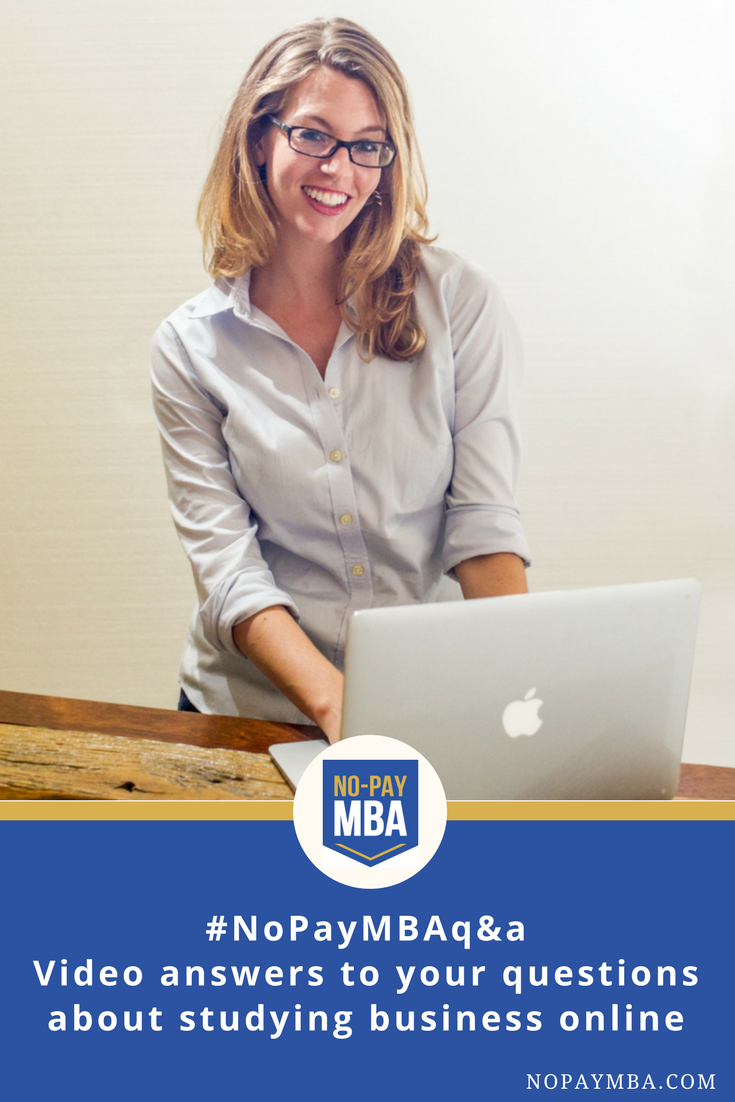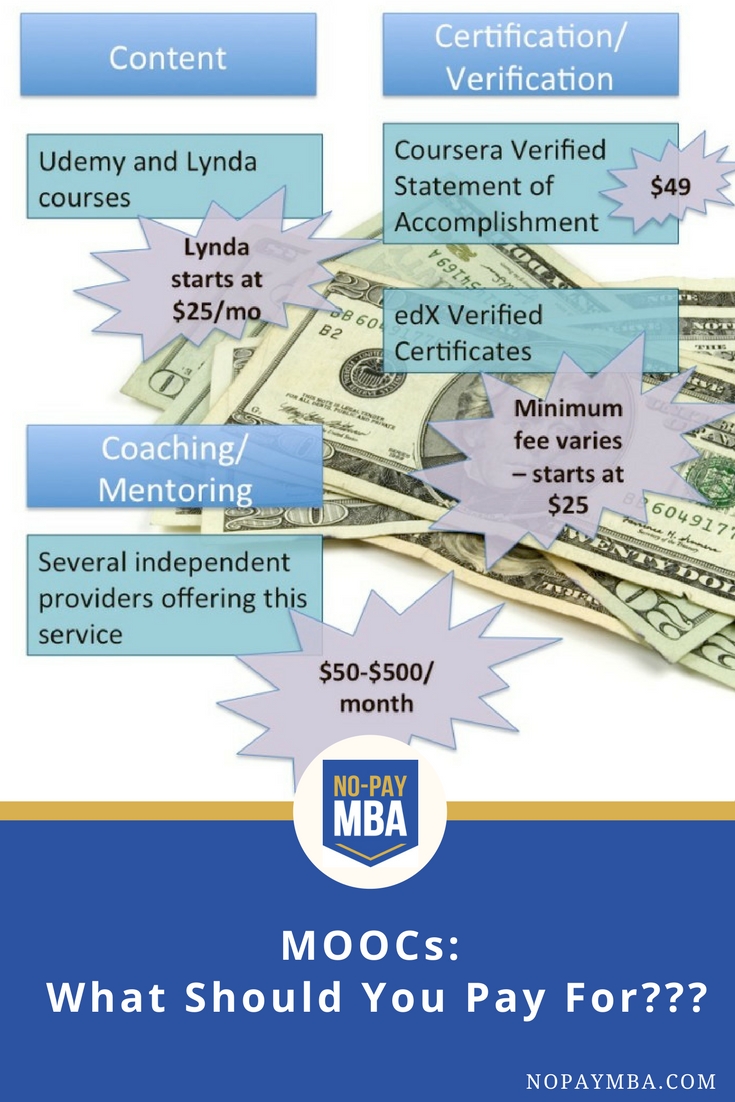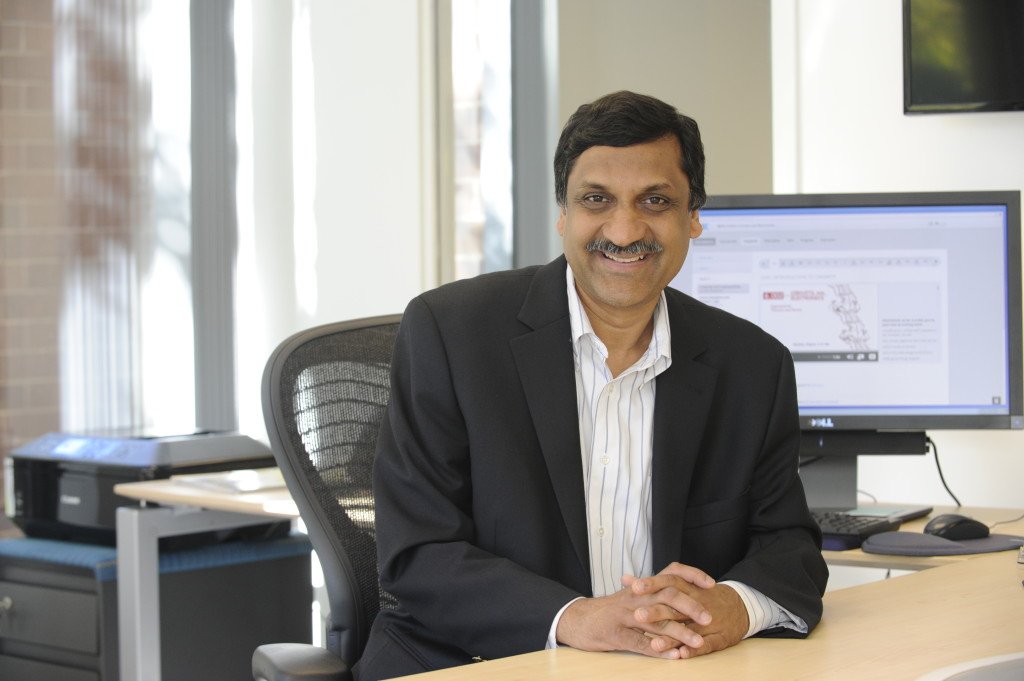by Laurie Pickard | Jun 24, 2015 | Career Development, Thoughts on Higher Ed and Life
This month the Lumina Foundation launched a national dialogue focused on transforming the credentialing system for higher education in the US. Here is my contribution to that discussion. I encourage readers to comment on this post or to add their voices to the discussion started by the Lumina Foundation.

Recently a reader of my blog sent me a link to a forum where a fascinating debate was taking place, spurred by the news that Coursera is phasing out its free Statements of Accomplishment for people who complete MOOCs. This debate crystallized around the question of whether credentials - not just MOOC credentials, but credentials in general - were worth anything.
“Portfolio trumps certificate,” says one contributor.
“Not in my country,” says another. “If you don’t have a certificate, good luck going through HR.”
“This is what’s wrong with employment,” a third chimes in. “I say this as a teacher who offers degree classes. You can earn a certificate without learning a damn thing.”
The discussion goes on at some length, but you get the idea.
So which is it? We all know that credentials (degrees in particular) are an absolute requirement to get certain jobs. But do they have to be? Can a portfolio ever win out over a credential? And what happens when Coursera completely gets rid of Statements of Accomplishment? Will MOOC students be obliged to pay for verified certificates in order for the courses to “count”?
How credentials work
Here at No-Pay MBA, we start from the premise that education has real value even when it it isn’t credentialed. In this article, I’ll explore credentials - what they are, what role they play in the marketplace, and whether it might possible to capture value from non-credentialed education.
To get started, let’s talk about the different types of credentials and look at how they function in the job market. I find it helpful to start by dividing credentials into two broad categories - degrees and all other credentials. I’ve heard David Blake, the CEO of Degreed refer to these categories as horizontal and vertical credentials. According to Blake, degrees are horizontal credentials; they level you up to a whole new category of job opportunities, lifting the floor underneath you.
Vertical credentials can be added on top of horizontal credentials, but they can’t be aggregated up to a horizontal credential at the next level. Most professional training courses fall into this category. Many fields recognize some type of non-degree credentials, but unlike degrees, these credentials are not generally understood outside of their field. Often if a non-degree credential is required, it must come with a degree, in the way that a teacher needs both a bachelor’s degree and a teaching certificate.
Are MOOCs just Sesame Street for adults?
 So what are MOOC course certificates, and what could or should they be? Should students be able to use them to build up to a horizontal credential like a degree? Or are MOOC certificates better understood as vertical credentials that are only valuable when stacked on top of a degree? Or maybe they’re neither - maybe MOOCs are best understood as edu-tainment, Sesame Street for knowledge-hungry adults. In which case, who cares if they come with any kind of credential at all?!
So what are MOOC course certificates, and what could or should they be? Should students be able to use them to build up to a horizontal credential like a degree? Or are MOOC certificates better understood as vertical credentials that are only valuable when stacked on top of a degree? Or maybe they’re neither - maybe MOOCs are best understood as edu-tainment, Sesame Street for knowledge-hungry adults. In which case, who cares if they come with any kind of credential at all?!
We can think about the possibilities for MOOC credentialing along a continuum. At one end of the spectrum, MOOCs are “just for fun,” personal edification that shouldn’t be taken seriously as professional training. There are plenty of people who will tell you that MOOCs are education for education’s sake, and that it’s impossible to capture any real value from them (in the form of a salary increase, for example).
At the next step along the continuum, MOOCs might be converted into more standard credentials. EdX’s partnership with Arizona State University is an example of this kind of arrangement; students can now take their entire first year of coursework at ASU via MOOC. After finishing the coursework, the MOOC certificates can be converted for credit at ASU. The same people who are saying that MOOCs are not capable of producing meaningful educational outcomes pooh-pooh such schemes as “credit laundering.”
At No-Pay MBA, we are at the opposite end of the spectrum. We believe it is possible to leverage a MOOC education for tangible career advancement, with or without a credential. And we think it’s only a matter of time before employers realize how valuable MOOCs can be. (In fact, they are already starting to.)
“If you don’t have a certificate, good luck going through HR.”
One big change that could bring efficiency into the hiring process would be the removal of the gatekeeping function of credentials that aren’t directly relevant to the jobs they keep people out of. The credential isn’t typically the only, or even the most important factor that determines whether you get a job, but as we all know, the lack of a credential can prevent you from getting one. But does it have to be this way?
I’m not opposed to degrees by any means; I have two of them, and I value them both, as well as the education they represent. But I do find it rather silly that HR requires a master’s degree - any master’s degree - for my current job, even though my master’s program in geography has very little relevance to my day-to-day work.
Here’s another thing I find a bit nonsensical about the way horizontal credentials work. Most people get their degrees fairly early in their careers and have finished their formal higher education before they are even 10 years into a work life that may span four decades.
The credential that you earn at age 22 or 25 doesn’t signal that you are at the top of your field, but rather that you are prepared to begin working in that field. Very often, the credential whose absence can keep someone out of a job doesn’t even signal work readiness for a particular field but instead serves as a signal of general competence. (Art history majors, anyone? Geography majors, for that matter?) And yet, even 15 years into a career, not having a degree or not having the right degree can still mean that you aren’t able to get a job that you are capable of doing.
One of the exciting things about MOOC education is that it is laying bare some of the contradictions in credentialed education. Why should it be necessary to have a degree just for the sake of having a degree, if there are other ways to get an education? If you can do the work, why should the credential you hold matter at all?
If the only reason to have a degree is because HR said so (not a very good reason), then it might be possible for MOOCs and other non-credentialed education to offer other pathways to employment. The company that finds alternative ways to select candidates for work readiness stands to clean up in the talent market.
Multiple pathways from education to employment
Of course, I don’t think HR policies are going to change tomorrow. But I do think it is possible for people who already hold degrees to demand that their efforts at continuing education be taken seriously. Let me start: I have a master’s degree, and I am telling you that my business education, which is entirely MOOC-based, is more relevant, useful, and applicable, than either of my degrees when it comes to preparing me for the work that I do. And I can back up that claim with a portfolio that shows how I’ve put my education into practice. (I’ll be publishing it on this website very soon.) Can I get you (employer) to trust me when I say that I have a business education equivalent to an MBA? I believe that I can.
I imagine a future in which there are multiple pathways from education to employment. The traditional, degree-based pathway remains. But non-credentialed educational pathways are also available, when backed up by strong portfolios. As a middle ground, competency-based programs can credential learning that takes place outside of traditional universities.
Wouldn’t many people benefit from this kind of flexibility? I know I have.
by Laurie Pickard | Jun 13, 2015 | Thoughts on Higher Ed and Life

I recently asked readers of the blog and followers of No-Pay MBA on Facebook to submit their questions regarding studying business online so that I could answer those questions with personal video messages. Many people submitted questions. Below are the video messages I sent out in response.
#NoPayMBAq&a Video 1
In the first video I answered questions about getting started on a MOOC-based MBA equivalent and how MOOCs differ from a traditional classroom environment.
#NoPayMBAq&a Video 2
In the second video I discussed why it might not matter if you don’t get a degree at the end of your business studies, ways that MOOCs might actually lead to degrees, and the value of verified certificates.
#NoPayMBAq&a Video 3
In the final video I shared some tips on how to present your MOOC MBA education and talked about how employers view MOOC-based business education, who can benefit from this form of education, and future directions for No-Pay MBA.
I hope you enjoy these videos!
by Laurie Pickard | Feb 28, 2015 | MOOC MBA Design, Thoughts on Higher Ed and Life

As the MOOC providers search for viable revenue models, the number of things you can pay for in the MOOC world has exploded. From subscription sites like Lynda, to micro-credentials like Udacity’s Nanodegrees and Coursera’s Specializations, the array of options is dizzying. None is as expensive as regular college credit, but fees for MOOCs now range from free with an option to pay $50 for a verified certificate (Coursera, edX), to upwards of $900 for a single course (NovoEd), to $200 per month for access to as many courses as you can handle (Udacity, Lynda).
In the early days of massive open online courses you couldn’t pay for a course or a certificate if you wanted to.
In my opinion, the proliferation of non-free options is a good thing; it is only by having sustainable business models that the MOOC platforms will be able to stay in existence and continue producing high-quality content.
But given that all of these products are new and unproven, as a MOOC student it can be confusing to sort through them.
What is your goal and how much can you afford?
Just over a year ago, an article about the No-Pay MBA went viral. The headline made reference to a figure of $1000, which was how much I planned to spend on my MOOC-based MBA equivalent. That original estimate of $1000 was actually what I planned to spend to build my website – including hosting, the price of the site itself, some help from people who know more about the internet than I, and other assorted fees associated with running a website. I had not at that time – and in fact I still haven’t – spent any money on courses themselves. To be precise, mine is not a $1000 education, but rather a free education with a $1000 website.
There are a lot more ways to spend $1000 on online learning now than there were a year ago, but the approach I would recommend hasn’t changed.
- First, get very clear about your goals.
- Second, determine how much money you can afford to spend to reach those goals.
- Finally, when deciding how to spend that money, look for those options that do some combination of the following:
- Give you access to specialized content
- Provide you the motivation to finish your courses
- Lend credibility to your studies
When I started this project, I didn’t need to pay for specialized content, since the content I needed was available for free. But I did need to find a way to bring credibility to my effort – and to stay motivated enough to see it through. Building a website was the best way to build credibility for online learning, and being accountable to my readers has been critical to maintaining the motivation I need to complete my courses.
Fortunately, you have many options when it comes to accessing specialized content, maintaining motivation, and building credibility. With those key principles in mind, here is my take on what you should pay for when it comes to online education.
Certificates and identity-verified certificates
What they are
Most MOOC platforms give certificates – free or paid – to indicate a student’s completion of a course. Coursera and edX also offer an identity-verified certificate to ensure that the student who holds the certificate is the person who did the work for the course.
How much they cost
Coursera and edX will give you a basic certificate for free. Future Learn and MiriadaX offer paid certificates (£29 and €40, respectively). Coursera’s identity-verified Statement of Accomplishment costs $49 per course. edX verified certificates are on a sliding scale, with prices typically starting at $25 or $50 per course.
Worth it?
If you need the extra motivation, yes. I’ve written a more detailed analysis of the value of identity-verified certificates, but when it comes to credibility, I don’t think these fancier certificates are worth the expense – unless paying for the certificate will give you the motivation you require to finish the course. Of course, you may want to support a non-profit like edX, or the course may be part of a longer series which requires identity-verification for the overall cert. Which brings me to the next option.
Micro-credentials
What they are
Series of courses packaged into sets. Udacity’s Nanodegrees are primarily for IT topics. Coursera has partnered with Wharton to offer a Business Foundations Specialization. edX offers a Specialization in Supply Chain Management.
How much they cost
Udacity charges $200 per month, so the more quickly you finish, the less you spend. Coursera charges $595 for its Business Foundations Specialization ($95 per identity-verified course certificate, plus $215 for a capstone project). edX charges $375 for the Supply Chain Management series.
Worth it?
A pretty good bet. Micro-credentials are still very new, but with employers now collaborating on their design, they are likely to look very good on a resume. Good enough to replace a degree? Not yet, but who knows what the future will bring.
Course content
What it is
Some sites require you to pay just to access their content. The most popular of these sites are Lynda, Udemy, and Udacity.
How much it costs
Varies significantly - $25 per month for a basic Lynda subscription, from $40 to $200 for most coursees on Udemy, $200 per month on Udacity.
Is it worth it?
Yes, if you can’t get the content for free somewhere else, and if you’ll use it consistently.
Mentorship/Coaching
What it is
Support from a tutor or coach as you work your way through the course content. Udacity offers limited coaching in its Nanodegrees. Sites like Thinkful and SlideRule specialize in coaching students through courses on coding and programming.
How much it costs
Part of the monthly fee on Udacity, SlideRule charges $400 per month, and Thinkful charges $500 per month. I offer more affordable packages, starting at $50 per month. You can learn more about No-Pay MBA coaching packages here.
Worth it?
Yes. Not many options exist yet for business students – this service is primarily geared towards IT courses – but having someone there to help you along is key to course completion, especially for difficult subjects.
by Laurie Pickard | Feb 24, 2015 | Courses, Platforms, and Profs, Thoughts on Higher Ed and Life

Christian Terwiesch is a professor at the University of Pennsylvania’s Wharton Business School. He teaches a popular MOOC, Introduction to Operations Management, which I took last year. That course, along with three other Wharton courses, now form part of the newly launched Business Foundations Specialization from Coursera.
Professor Terwiesch is also a thought leader when it comes to MOOCs and their potential for disruption in the market for business education. Along with Karl Ulrich, another Wharton professor, he authored an excellent paper called “Will Video Kill the Classroom Star?”, which explores the ways in which business schools and professors might come under pressure from new educational technology.
I caught up with Professor Terwiesch recently, and we talked about the Coursera-Wharton Specialization, as well as his current thinking on the future of business education.

LP: I want to start by thanking you. I took your course last year, I greatly enjoyed it, and I learned a lot from it. So thank you for offering it.
CT: I love your story. It’s these kind of stories that make the Coursera world so exciting.
LP: I’d like to ask you about the new Specialization from Coursera that involves all the Wharton courses. I want to ask you about who you imagine will use this and benefit from it the most. Who was the team imagining when the Specialization was created?
CT: I think this is about realizing that we have only a certain number of seats for people coming here to Philadelphia or to San Francisco to take Wharton courses. But there is much more demand, many more people who are interested in business knowledge provided by Wharton. Many people cannot come because they don’t have the financial means, many people cannot come because of geographic constraints. Through Coursera, these folks can get a sense of what Wharton is like without paying the money that you would have to pay to come here, and without moving to Philadelphia.
LP: I’m very excited about the Coursera Specialization, mostly for the possibilities that it opens up. We’re seeing more Specializations and things of this nature, and they are becoming more sophisticated with the inclusion of capstone projects and the involvement of businesses. What do you think we’ll see next in terms of offerings from the MOOC platforms?
CT: I doubt that in the foreseeable future we will be granting a degree based on MOOCs. But the trend goes towards using these courses first in the admissions process, then to start giving credit for them. So it’s only a question of time as to who offers a degree based on them. Certainly on the degree side I would think that the elite institutions will be the most conservative. But it is a trend. That train is rolling.
LP: I read “Will Video Kill the Classroom Star?” which you wrote last year with Karl Ulrich. I loved it, and I wanted to ask you some questions about it. You raised an important point, which is that MOOCs and the like will have a small effect, or even no effect, on top schools like Wharton. What do you expect will be the effect on other business schools?
CT: If you look at the full time MBA programs and you’re not in the top schools – if you are, let’s say, somewhere in the rankings below 50, you already start feeling the heat.
People are increasingly less willing to give up their work, move to a remote place for a two-year education that they could get online.
The same is true now in the executive MBA market, where people say, “I need this for my job, but why should I spend $100,000 for an MBA from the University of Nowhere if I can get it online from Harvard or from Wharton?”
Like it or not, for the business schools, MOOCs are not the great equalizer. As with other examples in globalization and technology, the rich get richer, and the poor get poorer. But, this is the perspective of the schools. For the people, fortunately, I think it’s the opposite. I think it’s wonderful because MOOCs help close the inequality gap. We can provide an Ivy League education to everybody, even if they didn’t have the grades in high school or the means to come here.
LP: As someone who’s studying while working I feel that I get an added benefit from being able apply some of what I’ve learned immediately at work - it’s not just that I’m avoiding the opportunity cost involved with taking time off of work. I have to think this is something that’s attractive to employers as well, and I wanted to hear what you think about that.
CT: We call this “learning on demand” – much smaller chunks of knowledge, studied and applied in real time. I think there’s lots of power in that business model. So will the employers go after it? That could be a real threat to us. I think that’s too early to say right now, but I certainly think that our big recruiters – McKinsey, Goldman, Google – if they all went down that path, that would be the biggest threat to our existence. The question is, could we as Wharton deliver this content on demand, or would McKinsey or Google just say “we’re going to cherry pick the content across all the courses that are available in this online learning space, and then people would study as they’re working for us”. Then we don’t need Wharton anymore. The problem with that model for the business schools is this whole idea of certification.
Certification is really only needed if you have studied for a long time and you haven’t deployed these skills. If you study a new skill and then deploy it the next day, I don’t need to certify you anymore.
You can just write on your CV how you’ve completed a successful merger or acquisition. I don’t need to write you a certificate that you’ve studied it. You actually are self-certified for having been successful on the job. So that I think is a big threat to our existence.
LP: Do you think that’s inevitable? Or is there still a market in which a certification could be highly valuable?
CT: Let’s start with the undergraduate market. Is somebody really going to go and take a high school student and throw them on the job and say you’re going to learn on demand? A young person needs a couple of years of personal development, some education, and because of our scale, we can provide both of this efficiently and at high quality. In the MBA case, it’s a little less clear whether that is the right model to deliver the knowledge. We’re back to this observation that we made in the paper that you really have to think of the business school as a bundle of services that we provide. There is the learning, there is the certification, but there are other aspects around networking, career management, and fun that you would lose if you acquire your knowledge on-demand. As long as we keep the learning as an integral part of a broader experience we will provide our service with a certain integrity that cannot be unbundled.
LP: I want to push you on that. Clearly the content can be unbundled. Do you see other opportunities for entities outside the university to capture other pieces of the bundle?
CT: Well my joke has always been that I’m afraid of a merger between Coursera and Club Med. If our story is that the experience of being around other students and the social interaction is so critical to what we do, then look, that is what Club Med is built around. You sprinkle in Coursera with the content. If those two merge, you have a business school. It’s a joke, but I think there’s some truth in it. There’s no reason to believe that we are the only place in the world where you could have a good time and learn something.
LP: I have one final question for you which is something very dear to my heart, and that is to hear your thoughts on the potential for MOOCs to increase access to business education in the developing world.
CT: As a research university we have a very funny business model where you write an academic paper for hundreds of thousands of dollars and then give them away for free. We train doctoral students at the expense of hundreds of thousands of dollars, and then they go and work for our competitors. We are used to doing work which benefits others. So which customer would be more honorable to serve than the poorest members of our globe? The more we can have these courses be delivered in regions that typically don’t have access to education at our level, or even within the US, a society with large income discrepancies, the more we are true to our mission as a university.
by Laurie Pickard | Jan 9, 2015 | Thoughts on Higher Ed and Life
 For those who are just finding this site, here’s a quick recap:
For those who are just finding this site, here’s a quick recap:
The goal: An Ivy League MBA education, minus the debt.
The plan: Two years of MBA course work spread over three years of part time study, all via MOOC from my home in Kigali, Rwanda, all while working full time.
Course work update
I’ve now completed about half of the MBA education I envisioned when I started this project in August 2013, and I’m on track to finish by summer 2016. Even though courses start continuously – and many are now offered in a self-paced, always-available format – I still like to think of my education in terms of semesters and units.
I’m at the start of my fourth of six semesters. (To see my courses from the previous three semesters, have a look at the Curriculum page.) So far I’m registered for two courses on entrepreneurship through edX – Entrepreneurship 101: Who is your customer? and Entrepreneurship 102: What can you do for your customer?
This semester I don’t have a well-defined plan for my studies so much as I have a checklist of courses and topics I feel I’m still missing or would like to go deeper into. These include:
- Data analysis
- Finance – more advanced topics
- Supply chain management – I’d like to finish edX’s series
- Computer science and programming – I’m a total newbie, but I would like to become at least semi-literate in one or two programming languages
Commencing the job search
Like regular MBA students, now that I’m in the second half of my business education, my focus is shifting towards what happens when I finish my studies. This is the big question, isn’t it? It is through my job search that I will put my No-Pay MBA to the test. How will I stack up next to other job candidates? Will employers understand, and more importantly, will they see the value of my education?
Fortunately, I am happily employed, and I have no plans to leave my current job. But two years from now, my husband’s tour in Rwanda will be over, and we will be moving (location as yet unknown). At that time I will most certainly be on the job market. Two years might sound like a long time to conduct a job search, but my research on how MBA students look for jobs indicates that it isn’t uncommon for MBAs to spend their entire two years job searching.
Since my success (or failure) at leveraging my studies for future employment is such a big question, I plan to post periodic updates on my job search and what I’m learning about the value of a MOOC-based MBA in the marketplace.
How to build a startup – for real
The most exciting thing I’m starting this semester is some work for a startup called Coursolve. Here’s how I got involved: First, the Udacity course How to Build a Startup, which is still one of the best courses I’ve ever taken (online or otherwise), got me thinking about startups. Then, while enrolled in Foundations of Business Strategy, I came across Coursolve, whose online platform connects MOOC students with business through digital internships. I had a great experience doing a strategic analysis for Coursolve– so good that I’ve come on to do some business development consulting for the company. This is great experience for me – getting to work inside a startup that is still gettings its legs – and of course I expect to bring some value to the company as well.
by Laurie Pickard | Jan 1, 2015 | Courses, Platforms, and Profs, Thoughts on Higher Ed and Life

Recently, I got the opportunity to speak with Anant Agarwal, CEO of edX. As the professor of edX’s first-ever MOOC and a proponent of access to education, Mr. Agarwal is one of the luminaries of online education. edX has over 3 million users from every country in the world. Of the Big 3 MOOC platforms, edX is the only one that is operated as a non-profit organization. Mr. Agarwal and I talked about a variety of topics, including how edX is making MOOCs more accessible to underserved populations, how online education can lead to employment, and of course, whether MOOC-based degrees are on the horizon.
LP: To start I want to say thank you. Thank you for speaking with me, but more importantly, thank you for putting all of this great content out into the world.
AA: You know, I’ve been seeing folks like yourself taking advantage of our resources to further their education, with the key words being “without incurring additional debt.” I think it’s great.
LP: Thank you. I have a bunch of questions so maybe I can just dive right in.
AA: Please do.
LP: First of all, I’ve been impressed with edX’s dedication to reaching populations that haven’t been served, but a lot of the press coverage of MOOCs that’s been negative has focused on the high educational level of people who are taking them. I’m interested in hearing whether you think the edX user population is a match with the target population you’re going for.
AA: Our mission was really to create a better world and provide access to education for learners all over the world. When we started out we had in mind learners frankly not such as yourself, student who in some sense need the education the most – college going students, high schoolers. Then when the data came back, we found that about 66% of our learners already had a college degree, about a third did not.
When the data came out saying a significant portion of the users already have a college degree, the view any for-profit MOOC providers took was, that’s where the market is, how do we serve that market? We’re a non-profit, and the view we’ve taken is the exact opposite. Which is, look, as part of a non-profit mission we’ve set out to solve a certain type of problem, and so rather than react to market forces, we have to change what we’re doing to really reach the kind of people we need to reach.
So, we launched a high school initiative, we started partnerships with many developing countries, we open-sourced our platform, all to try to reach that demographic. With the high school courses, for example, we’ve really moved the needle. For those courses only 50% of the learners already have a college degree. Also, it turns out that of those that have a college degree, parents and teachers are a substantial part. So we have ways in which we can reach our goals.
This is not to say that we don’t serve people who already have college degree, we do — we want to target learners from 8 years of age to 95 in a model we call continuous lifelong education — it’s just that we have to travel the extra mile to reach the people that really need it. In some sense this is probably not what you want to hear since you yourself are in that 66%.
LP: That’s true, but I still find that the courses on edX are extremely challenging, and when you provide challenging content, people who are seeking a challenge will appreciate it no matter where they come from or what their background is.
AA: Maybe you’re right there, Laurie. We attract a certain demographic, people who like a challenge. And that said, many of our courses require prerequisites. Let’s say you have a learner in Africa, and they want to take a great course in entrepreneurship or innovation or management, and there’s some pretty deep mathematics associated with it. You have to have the basic mathematics courses first before you can even conceive of taking those courses. That’s why we’re working to come up with the prerequisite courses all the way from high school to college so that we can create pathways for students no matter where they are in their education.
LP: Even though I may not be the typical developing world student, I am a learner taking MOOCs from Africa. I’m interested in hearing more about how MOOCs can be useful in a developing world context. I’m curious to hear how you see MOOCs making inroads into geographies without great access to higher education.
AA: Here, I can speak from the heart since I grew up in India. Some of my own experiences growing up shaped my own thinking and the thinking around what we are doing. Access to education for people in the developing world is a big part of what we want to do. In terms of that demographic, it turns out that the types of courses matter a lot. For example, the poverty course from Esther Duflo and Banerjee from MIT, it focuses on issues of poverty and development, that course gets a lot of students. So first of all is the type of courses, second of all the translations. There have been translations of the platform into many languages – Hindi, for example, French, Portuguese, Spanish, Mandarin Chinese, and so on. We’ve also created partnerships. For example, SocialEdu is a partnership with Facebook, the Government of Rwanda, Nokia, and Airtel, to provide mobile access to courses on smartphones. We’re doing these partnerships with Facebook and others to see if we can improve access in parts of the world where people need it the most.
LP: Another question that’s on my mind is about the link between MOOCs and future employment. I think it’s something that is very important to a lot of people who are taking these courses. What do you think about the connection between MOOCs and employment? Is there a pathway there?
AA: Absolutely. So at the end of the day if this is just a curiosity, well that’s fine, but we really want to help people. And finding jobs is one important area. In fact, we did a pilot about a year and a half ago where we tried to help about some of our students get jobs, and we could not place a single student. And the reason is that many HR departments didn’t understand the MOOC credential. Now things may have changed. There was a recent study done by RTI in which 70% of the employers surveyed indicated that they would look favorably on MOOCs mentioned in a resume of people that apply.
Now we’re working with organizations to help people find jobs. The most salient example is a partnership we did with a grassroots organization called LaunchCode, an experiment we called The St. Louis Experiment. They partnered with us with the thought that people can learn how to code, and a lot of companies need people who can do coding jobs, but without having a degree or a certificate HR departments weren’t looking at them. So we partnered with LaunchCode, and we got the CEOs of 100 St. Louis companies to sign up and agree to hire people with MOOC credentials. LaunchCode did a boot camp, and as part of that a large number of students took the edX CS50X Computer Science course from Harvard. Already this experiment has placed more than 100 people into jobs.
We have to make ground up change in the way people think, and we are doing it. The White House has gotten very interested in this, and they have encouraged us to work with LaunchCode to take this national. We’re starting with Miami next and will see where we go from there. So really, we’re doing a number of things that you would maybe not see from a for-profit startup. A lot of the efforts are simply things we believe we should do and there is no monetary benefit.
LP: You mentioned that when HR sees MOOCs on a resume, they still have a need to see a degree or some sort of certification. So I wonder, do you think that we will eventually see degrees made up entirely of MOOCs? Is that what’s coming next?
AA: Yes. I believe that will happen within the next 5 years. Actually, many of our university partners have expressed interest in doing something like this. There’s a lot of interest in making this happen, and I do believe it will happen.
 So what are MOOC course certificates, and what could or should they be? Should students be able to use them to build up to a horizontal credential like a degree? Or are MOOC certificates better understood as vertical credentials that are only valuable when stacked on top of a degree? Or maybe they’re neither - maybe MOOCs are best understood as edu-tainment, Sesame Street for knowledge-hungry adults. In which case, who cares if they come with any kind of credential at all?!
So what are MOOC course certificates, and what could or should they be? Should students be able to use them to build up to a horizontal credential like a degree? Or are MOOC certificates better understood as vertical credentials that are only valuable when stacked on top of a degree? Or maybe they’re neither - maybe MOOCs are best understood as edu-tainment, Sesame Street for knowledge-hungry adults. In which case, who cares if they come with any kind of credential at all?!










